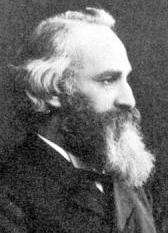Karl Davydov
Karl Yulievich Davidov (Russian: Карл Юльевич Давидов; 15 March [O.S. 3 March] 1838 – 26 February [O.S. 14 February] 1889) was a Russian cellist of great renown during his time, and described by Pyotr Ilyich Tchaikovsky as the "czar of cellists". He was also a composer, mainly for the cello.
Karl Davidov | |
|---|---|
 | |
| Background information | |
| Birth name | Karl Yulievich Davydov Карл Юльевич Давыдов |
| Born | 15 March 1838 [O.S. 3 March 1838] |
| Died | 26 February 1889 [O.S. 14 February 1889] (age 51) Moscow, Imperial Russia |
| Genres | Classical |
| Occupation(s) | Cellist, composer, conductor, pedagogue |
| Instruments | Violoncello |
| Years active | fl. ca. 1850–1889 |
Biography
Davidov was the son of a physician from Courland Governorate. His elder brother August Davidov was a noted mathematician and educator, and his nephew Alexei Davidov also became cellist and composer and also a businessman.
In his youth Davidov studied mathematics at Moscow State University, and then pursued a career as a composer, studying with Moritz Hauptmann at the Leipzig Conservatory. He became a full-time cellist in 1850 while continuing to compose in his spare time. He later became head of the St Petersburg Conservatory. He had many students, including Aleksandr Verzhbilovich.
In 1870 Count Wilhorsky, a patron of the arts, presented Davydov with a Stradivarius cello constructed in 1712. This cello, now known as the Davidov Stradivarius, was owned by Jacqueline du Pré until her death and is currently on loan to cellist Yo-Yo Ma.
He intended to write an opera on the subject of Mazeppa. Viktor Burenin wrote a libretto for this purpose in 1880, but when Davidov proved unable to find the time to compose, Burenin offered the libretto to Tchaikovsky.
Although closely associated with Tchaikovsky, Karl Davidov was not related to the Davydov clan into which Tchaikovsky's sister Alexandra married. Davidov died in Moscow on 26 February 1889. Anton Arensky dedicated his first piano trio to Davydov's memory.
Cello Transcriptions
Davidov (also appeared in different spellings: Davidoff / Davidov) transcribed and arranged Chopin's solo piano works for violoncello and piano accompaniment. Transcription albums of Walzer and Mazurkas published by Breitkopf & Härtel. Another transcription album is a selection of Nocturnes and others solo piano works published by Edition Peters.
Works with Opus number
- Opus 5, Cello Concerto No. 1 in B minor (1859)
- Opus 6, Souvenir de Zarizino: 2 salon pieces (Nocturne – Mazurka) for cello and piano
- Opus 7, Fantasie from a Russian folk song for cello and orchestra
- Opus 11, Concert Allegro in A minor for cello and orchestra or cello and piano
- Opus 14, Cello Concerto No. 2 in A minor (1863)(1860?)
- Opus 16, 3 Salon pieces (Mondnacht, Lied, Märchen) for cello and piano
- Opus 17, Souvenirs d'Oranienbaum (Adian – Barcarolle)
- Opus 18, Cello Concerto No. 3 in D major (1868)
- Opus 20, 4 Pieces for Cello and Piano
- No. 1, Sonntag Morgen (Sunday Morning)
- No. 2, Am Springbrunnen (At the Fountain)
- No. 3, An der Wiege
- No. 4, Abenddämmerung
- Opus 23, Romance sans Paroles in G major
- Opus 25, Ballade for cello and orchestra or piano in G major (1875)
- Opus 30, 3 salon pieces
- Opus 31, Cello Concerto No. 4 in E minor (1878)
- Opus 35, String Sextet
- Opus 37, Suite pour l'orchestre (Suite for Orchestra)
- I. Scéne rustique
- II. Quasi valse
- III. Scherzo
- IV. Petite romance
- V. Marche
- "Poltawa", Opera after Pushkin (1876, unfinished)
- Opus 40, Quintet for Piano and Strings in G minor (1884)
References
- "Karl Davidov". Great Cellists of the Past. Internet Cello Society. Retrieved 2007-09-07.
- Карл Юльевич Давыдов (in Russian). Peoples.ru. Retrieved 2007-01-17. (family name written incorrectly)